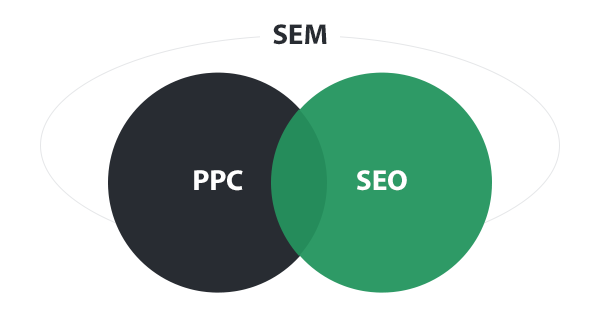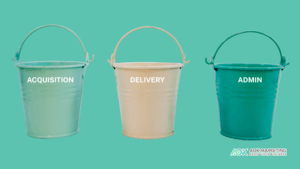
“Should I drive my competition into the ground using PPC (pay-per-click) ads or an SEO (search engine optimization) strategy, or both?”
“Which one should I start with first?”
“Is it a good idea to start both in parallel, hoping one of them will yield the results I am hoping for?”
These are typical questions many entrepreneurs and business owners often wonder out aloud and there is, unfortunately, no direct or Plain-Jane answer to it. However, if you completely understand what your business goals are, then that’s a good start.
Some of the things to ask yourself when narrowing down specific business goals is what kind of service and/or product you’re selling, how much you need to educate prospects before they agree to purchase, whether you’ve already established your name in the industry, and, is there a relatively large entry barrier that needs to be broken, if you’re introducing a new product/service.
Does that sound like too much work? Not necessarily. The important thing to do is to not get ahead of ourselves and first, understand a few key differences with regards to how PPC and SEO work.
SEO VS PPC: Analysis at a Glance and Why Each One is Important
Businesses operating at any scale have come to realize the importance of good online marketing tactics, especially since the social media and online purchasing boom, and search engines come heavily into play.
These days, you are much more likely to find prospects and customers arriving on your site through a search engine rather than navigating to it directly. A research revealed that 81% users find their desired business through search engines. This solidifies the fact that it’s absolutely crucial for your brand to have a dominating presence in search engines, so that your target audience can easily find you.
However, you will be faced with this dilemma one way or another: ranking high in organic search results through search engine optimization or pay-per-click ads that make use of purchased ads on Google and Sponsored Links to allow audiences to discover you?
If done right, both of these can land you on Google’s front page for targeted keywords in order to get discovered by the right audiences. Now, here’s the thing: each respective method has certain costs and benefits that must be weighed carefully.
Want to better understand how SEO qualifies against PPC? A study discovered that organic results have the ability to generate 8.5 times more clicks compared to paid search results. That is an astonishing number and a rather large disparity which attributes to online searchers learning to differentiate between sponsored results and organic ones; the fact of the matter is they have understood that organic results are ideally a more concrete and respected resource.
PPC on the other hand, has the advantage of offering better conversion rates – paid search results have a 1.5 times higher likelihood of converting click-through from search engines. What we really need to come to terms with is the fact that PPC’s actual strengths are its expansiveness and speed.
When running a successful PPC campaign, you can find yourself on the first page of search engines using a variety of targeted terms, within just one day it might be noted. There’s a slight catch though: these terms can cost you as little as just a few pennies per click to several dollars, in some cases, several hundred dollars per click. In addition, for running PPC campaigns effectively, companies almost always hire a digital marketing firm to crunch the numbers and have it managed on a full time around-the-clock basis.
It is estimated that 87% of search engine investments go into PPC compared to 11% on SEO efforts. So on one hand, we have established that SEO can generate 8.5 more clicks than PPC, while you incur just 1/8 of the cost. On the other, PPC can give you exposure fast, under certain circumstances that SEO simply can’t because of the time factor involved, as SEO efforts take time to gain momentum.
PPC is considered reasonably more effective for product-driven companies rather than those offering services only. However, we can also flip the picture and argue over the fact that SEO offers better search marketing value when we talk long-term value of your internet marketing efforts. You certainly won’t snag the number one spot overnight with SEO but it is a more affordable solution, one where the benefits have indeed been proven.
A Detailed Road Map: When to Use PPC or SEO
Knowing which one to use is a matter of what goals you have at the moment, as discussed early on the article, and specific circumstances which decide which one is ideal.
For now, let’s narrow it down further to two deciding factors:
- How much time your business has to deliver results
- The current competition you’re dealing with
Do I have Time to Achieve These Business Goals?
How quickly are you looking to get results? A month or less? Perhaps within weeks?
Do you need leads right this instant or can you afford a little breathing room to ensure that you continue to get solid leads in future?
Know that even the best SEO efforts can take a few months, maybe even years to deliver concrete results. The higher you rank for targeted keywords, the more traffic and leads you will generate from organic search results. However, you also need to consider building backlinks, leveraging domain authority and continuing to saturate your pages with rich and meaningful audience-specific content, which by the way, doesn’t just come about overnight. SEO can also be quite unpredictable, given the ever-changing search engine algorithms. So just because a tactic worked well last year doesn’t mean it will deliver the same impressive results this year.
According to data, organic search was responsible as the largest traffic and revenue driver for websites (51%) compared to paid search (10%). What this means is that if you’re willing to organically boost your keyword ranking to the number one spot, you stand to gain more traffic as well as revenue, compared to relying on paid search alone. In addition, you’ll build better credibility with searchers as they’ve become smarter over the years and know that websites which naturally appear in search results are higher authority sources, compared to those who paid to get there.
Do I need Leads Really Quickly?
When it comes to getting the desired results or outcome quickly, PPC has the potential to deliver within days, sometimes even hours. All you have to do is create an AdWords campaign, allocate your budget and flip the switch when it’s time. Set up your PPC campaign up correctly, and your ads will start appearing on Google in the top four ad slots. And this means when a searcher uses keywords that are included in your ad campaign, they’ll see your business right at the top of search result pages.
It doesn’t just end here; once you have data on the paid search campaigns of your competitors and access to metrics for keyword analysis, you can make very well-informed decisions on where and when to advertise. Once the ad campaign is running on full swing, this data helps you identify underperforming ads, keywords that are too costly and below par conversion rates, which lets you make adjustments on the fly to reap maximum rewards.
If your sales cycle is generally short, PPC has a very low turnaround to show your ROI (return on investment). Reason being that you can make use of forms, landing pages and certain targeted information to see traffic converting to sales. In fact, in some cases, ROI from PPC campaigns is almost immediate. There’s another catch, however: you’re capturing roughly 10% of the desired traffic using paid search and should you stop funding your PPC campaign, you will lose that traffic. It’s that simple.
Am I Dealing with Heavy Competition in the Search Results?
Google a few keywords you want to rank for. See who’s ranking above you. See how your competitors are ranking and what kind of content they are writing. Also pay close attention to the competitors who are getting the most backlinks.
If the industry you’re in generally has low competition with regard to search results, you need to demonstrate that you really are the best in your respective industry through quality content, thought leadership and referring domains. All these attributes will organically catapult you straight to Google’s top ranking slots.
How exactly do you determine that competition is low in your industry? Competitors that are outranking you on Google – if they are not actively building a backlink profile or writing quality content, competition is low and you should focus more on your SEO efforts at this stage.
Competitive analysis tools like Domain Authority Checker and AHREFs let you take a peak at what’s required to land that number one spot on Google. Let’s say if you’re currently being ranked in the top 5 with a hundred backlinks or so, and businesses ranked in the top 3 slot with the same amount of backlinks, the right SEO strategy can effectively boost you to the number one spot. And, for a fact, low competition means that you’ll be the first one to write really engaging content that your prospects are hoping to find, which will definitely help you rank higher for long-tail keywords.
Finally, once you manage to top the organic search result pages, you ranking won’t drop that easily. While it takes a serious amount of legwork to try and take the number one spot, it doesn’t require as much to stay there – your competitors aren’t really in a position to take advantage of potential blind spots the way they can with PPC.
What if My Industry Has High Competition in Search Results?
It can be impossible to outrank authority sites which are already using the same target keywords as you, not unless you are willing to invest a large chunk of your time and money. So in this situation, it makes complete sense to get traffic through a PPC campaign.
One major benefit of using PPC in a competitive landscape is it lets your business appear at the top of Google without going through the required wait time (as is the case with SEO) to boost organic listings. Additionally, since PPC functions on a live auctioning basis, you are at liberty to advertise right next to your competitors’ ads and appear in organic search results just like them. The key thing to remember her is bid; if you bid higher than your competitors, combined with better quality scores, your ads can even appear above them.
PPC also provides for some interesting spying capabilities to let you better tailor your ad campaign, based on tried-and-true methods being employed by your competitors. Dial 1.888.566.2577 now for a FREE consultation and learn how AOK Marketing can help you can unlock PPC’s full capabilities to outgun competitors.
Are My Competitors Also Paying for Ad Clicks?
You need to determine two things here:
- How high the estimated competition level is
- How expensive each cost-per-click is
Google’s Keyword Planner can help you get the desired information by simply entering the target keywords.
Depending on your industry, it may have a low or high cost-per-click (CPC).
In case of the former:
In industries where competition is low, businesses generally go for the long-term results that SEO yields. But, if authority sits are ranking above you in organic listings while your industry keywords have a low cost-per-click, paying for traffic through PPC is ideal, because you’re not shelling out as much cash per lead. This means low cost-per-acquisition costs more or less.
In case of the latter:
You need to consider the worth of each lead and weigh it against your cost-per-click. If the CPC is high and you feel that a lead is really worth that amount of money, you should definitely opt for PPC ads. On the other hand, if the CPC is still high but your leads are not really worth that amount, it’s going to be tough for advertisers to generate profits through a PPC campaign. In such a scenario, the same amount of money might be put to better use on SEO efforts.
So What’s the Bottom Line?
Well, not to oversimplify things, but the plain fact is that you are best off using both PPC and SEO at the right time and depending largely on your unique business goals. PPC certainly bring home the bacon a lot faster, in which case, you can run an ad campaign to test keywords which convert better and perhaps, then shoot for SEO to rank high for those target keywords.
Generally, PPC is best suited to high converting products while SEO is good when you’re not limited by time and have a limited advertising budget. SEO takes time to reap the rewards but generally yields longer lasting results, while PPC will stop generating traffic the moment you stop paying for those clicks.
About The Author
Dave Burnett
I help people make more money online.
Over the years I’ve had lots of fun working with thousands of brands and helping them distribute millions of promotional products and implement multinational rewards and incentive programs.
Now I’m helping great marketers turn their products and services into sustainable online businesses.
How can I help you?




